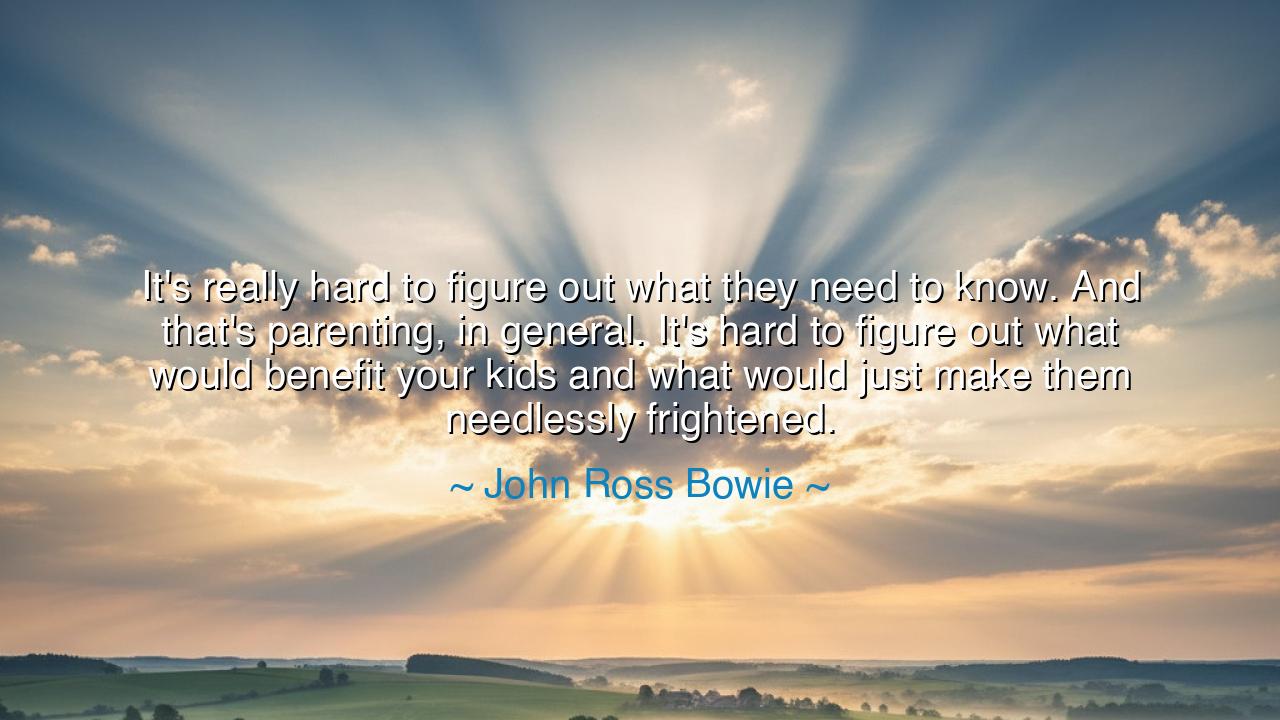
It's really hard to figure out what they need to know. And
It's really hard to figure out what they need to know. And that's parenting, in general. It's hard to figure out what would benefit your kids and what would just make them needlessly frightened.






Hear the voice of John Ross Bowie, who speaks with the trembling honesty of a parent: “It’s really hard to figure out what they need to know. And that’s parenting, in general. It’s hard to figure out what would benefit your kids and what would just make them needlessly frightened.” These words shine a light on the delicate balance of raising children, a balance as old as humanity itself. For parents are not only protectors and providers, but also teachers. And yet, the hardest lesson is knowing which truths to reveal, and which to keep hidden until the child is ready.
From the earliest days, parenting has been a dance between truth and protection. The ancients told their children stories, sometimes soft and nurturing, sometimes dark and cautionary, each chosen to prepare young minds for the world ahead. But too much harshness could crush innocence, while too much sheltering could leave a child defenseless. Thus, parents across centuries have faced the same struggle Bowie describes: how to guide without overwhelming, how to prepare without wounding.
Consider the tale of the Spartan youth. From an early age, boys were told brutal truths: life is war, pain is training, and fear must be conquered. These lessons forged warriors, but they also denied them tenderness and left them ill-prepared for gentleness. By contrast, in other cultures, children were spared the harsher truths until maturity, yet sometimes this left them unready to face the cruelty of the wider world. Here lies the paradox Bowie names: what benefits the child, and what merely frightens them? No parent can always know.
The struggle is intensified by love itself. For love longs to protect, but wisdom demands preparation. A parent who tells a child nothing leaves them naive and vulnerable; a parent who tells them everything too soon may sow terror in their heart. This is why Bowie calls it “hard”—because parenting is not the execution of a formula, but the continual weighing of choices under the weight of love. Each moment asks: shall I shield, or shall I reveal? And in that choice lies both risk and hope.
Yet within this difficulty is also nobility. For parents, though uncertain, still strive. They may falter, but their striving itself is proof of their devotion. The parent who worries about giving too much truth or too little has already shown the essence of love: concern for the soul of their child. What Bowie gives us, then, is not despair, but the reminder that humility is part of the calling. No parent will choose perfectly, but in the striving lies the lesson children will remember—that their parents cared enough to wrestle with uncertainty.
The lesson, then, is clear: walk the middle path. Teach your children with honesty, but season truth with gentleness. Reveal the world in layers, giving them what they can bear, while holding back what would harm before its time. When they stumble, be there to explain; when they fear, be there to comfort. In this way, knowledge becomes a shield, not a weapon, and truth becomes a lantern, not a fire that blinds.
Therefore, let all who hear these words take heart: you will not always know what to say, nor when to say it, but let love be your compass. Err not on pride, but on compassion; not on fear, but on wisdom. Speak when silence would endanger, and remain silent when speech would overwhelm. And above all, remember that parenting is not perfection, but presence.
Thus John Ross Bowie’s words, spoken with honesty, echo the timeless truth of the ancients: the hardest task of parenting is discerning what to teach, and when. And though the task is fraught with uncertainty, it is also filled with glory—for in walking this path with care, parents shape not only their children’s knowledge, but their courage, their resilience, and their trust in love.






AAdministratorAdministrator
Welcome, honored guests. Please leave a comment, we will respond soon